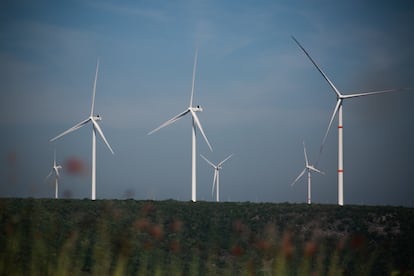Financial sector faces challenges amid climate crisis
It’s important that entrepreneurs and investors put forward proactive green proposals. Coherent regulations are also essential to move towards carbon-neutral and resilient economies

Many of us have life insurance or retirement funds: we may allocate a portion of our salary to them each month. But we rarely know how our money is being invested. We simply trust that, when the time comes, the resources will be available to us and that the financial system will have invested our savings wisely. Still, we don’t necessarily know precisely where our money is being invested, nor do we know what regulatory framework financial institutions are operating under.
At the end of COP28, held in the UAE in November and December of 2023, the resulting agreement called on governments, banks, investors and other financial actors to use “climate disclosures” as a fundamental step towards achieving access to climate finance in all regions and sectors. This was also put forward so that depositors can clearly know what’s going on behind their savings and investments.
The resolution represented a global recognition of the urgent need to coordinate sustainability efforts with private entities, in order to expedite the constant creation of new and innovative sources of financing for climate action.
For this and more reasons, the results of the Latin American Climate Assets Disclosure Initiative (LACADI) — completed in collaboration with experts from the Global Sustainability Standards Board (GSSB) — looked at the progress of 48 institutional investors (nine pension funds, 17 insurance companies and 22 asset managers) operating in Colombia, Mexico and Peru. The LACADI 2023 Ranking — based on the status of the implementation of international recommendations to achieve climate disclosure — is important to identify the needs for capacity and support, while ensuring that Latin American investors clearly disclose the risks and opportunities that climate change presents in their portfolios.
In Colombia, the participants in the ranking represent 21% of pension and insurance assets, while in Mexico they reach 19%. In Peru, the participants make up an overwhelming 90% of reported assets.
According to the findings of the ranking, 78% of pension fund administrators (AFPs), 35% of insurers and 68% of other asset managers in Colombia, Mexico and Peru don’t take climate change-related risks into consideration when doing their financial planning. In a world where the impacts of climate change are increasingly evident, the destination of our investments and the responsibility of these financial actors should be priority concerns. This is because of the financial risks posed by the effects of the climate crisis, but also because of the opportunities presented by portfolio decarbonization.
In Latin America, many companies and investors have been preparing for a changing climate scenario. However, this ranking reveals that the information presented by the region’s financial sector isn’t sufficiently comprehensive, traceable and costed (it’s also only available in Spanish, a language that isn’t fully compatible with the artificial intelligence-based search engines being used). Achieving a clearer picture of the efforts being made by these regional actors could redirect and increase resources allocated to climate change, identify areas where support is required, increase confidence in investments, support the development of new markets, and diversify the economy.
While understanding the challenges and identifying the necessary supports for financial actors in Latin America, the information must flow from the region to the global level. This should be based on a strategy that acknowledges how financial and business sectors are making important disclosure efforts under international standards, but that there are still large gaps in the incorporation of climate risks in investor strategies. Latin America’s investors must make a unified effort, one that can be clearly observed by the international community.
Almost 10 years after the adoption of the Paris Agreement, the time for lecturing has passed.
It’s important that entrepreneurs and investors put forward proactive green proposals. Coherent regulations are also essential to move towards carbon-neutral and resilient economies. To achieve this, we must work on three critical points:
- Clearly define new, clean, sustainable and decarbonized investment portfolios as factors that tangibly impact society.
- Activate sustainable investments and alternatives that ensure profitability, with the development of specific mechanisms and pathways that create diversified and environmentally friendly markets.
- Promote a coherent and achievable regulatory environment. There’s no stronger trigger than regulation. However, in the case of climate disclosures, collaborative work with the firms being regulated is key.
All of us — whether we’re pensioners, policyholders, investors, or financial consumers in general — have the power to drive significant change. We can demand that the financial institutions responsible for our savings invest in a secure future. We must ensure that our resources aren’t trapped in outdated investments and that financial institutions consider both the risks and opportunities associated with the transition to renewable energy and climate sustainable technologies. And it’s time to place Latin America at the forefront of the climate fight, including the region’s financial sector.
Sign up for our weekly newsletter to get more English-language news coverage from EL PAÍS USA Edition
Tu suscripción se está usando en otro dispositivo
¿Quieres añadir otro usuario a tu suscripción?
Si continúas leyendo en este dispositivo, no se podrá leer en el otro.
FlechaTu suscripción se está usando en otro dispositivo y solo puedes acceder a EL PAÍS desde un dispositivo a la vez.
Si quieres compartir tu cuenta, cambia tu suscripción a la modalidad Premium, así podrás añadir otro usuario. Cada uno accederá con su propia cuenta de email, lo que os permitirá personalizar vuestra experiencia en EL PAÍS.
¿Tienes una suscripción de empresa? Accede aquí para contratar más cuentas.
En el caso de no saber quién está usando tu cuenta, te recomendamos cambiar tu contraseña aquí.
Si decides continuar compartiendo tu cuenta, este mensaje se mostrará en tu dispositivo y en el de la otra persona que está usando tu cuenta de forma indefinida, afectando a tu experiencia de lectura. Puedes consultar aquí los términos y condiciones de la suscripción digital.








































